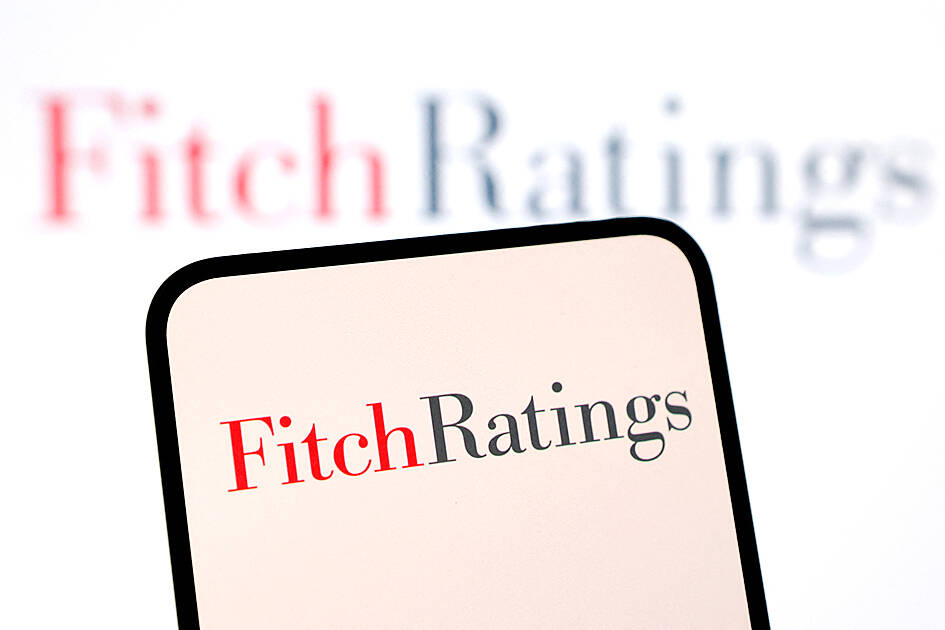Taiwan’s three online-only banks are narrowing their losses as they scale up operations, but continued shareholder backing remains essential for them to achieve profitability, Fitch Ratings Ltd said in a report released yesterday.
Losses at Rakuten International Commercial Bank Co (樂天國際商業銀行), Line Bank Taiwan Ltd (連線商業銀行) and Next Commercial Bank Co (將來商業銀行) have moderated, although growth momentum is slowing as client adoption falls short of expectations.
“Shareholder support is crucial until they become profitable and is the key driver for their ratings,” Fitch said.

Photo: Reuters
The three banks, launched with a goal to reshape Taiwan’s financial sector, have reported losses since their inception. While their customer bases have expanded, profitability remains elusive.
Analysts have said that the lenders need to diversify beyond deposits and small consumer loans, developing digital wealth management, small-business finance and regional fintech partnership services.
Regulatory relaxation — likely as soon as next quarter — could provide a boost by improving deposit inflows and stimulating lending to small and medium-sized enterprises (SMEs), Fitch said.
The Financial Supervisory Commission is considering easing offline requirements for virtual banks, including face-to-face identity checks and in-person client meetings at service centers.
The move is expected to help the online-only banks expand funding sources and lending options.
Line Bank’s loan-to-deposit ratio rose to 87 percent in the first half of this year, up from 78 percent at the end of last year, Fitch said.
Rakuten Bank and Next Bank are also focusing on SME lending and syndicated loans to accelerate credit growth.
However, further investment in staffing and digital infrastructure would require fresh shareholder funding.
According to local rules, banks must replenish capital once accumulated losses reach one-third of paid-in capital.
To absorb losses and support expansion, Line Bank raised NT$7.5 billion (US$247.57 million) in 2022 and NT$5 billion in June this year through rights issues. Next Bank raised NT$2.6 billion in 2023, and it and Rakuten Bank might need additional capital next year.
“The need for capital support underscores their dependence on parent groups to fund expansion until they can achieve sustainable earnings,” Fitch said, adding that its rating assumptions rest on the banks’ strategic roles within their parent ecosystems.
That view could change if the three lenders are no longer regarded as strategically important in terms of franchise value, ecosystem integration or synergies, Fitch said.
Taiwan’s high smartphone penetration rate and robust appetite for digital services have created fertile ground for virtual banks, particularly among young adults, who tend to be more willing to try new platforms.
Even so, traditional Taiwanese banks remain powerful, trusted and increasingly digitalized, posing a formidable challenge to their online-only rivals.

GROWING OWINGS: While Luxembourg and China swapped the top three spots, the US continued to be the largest exposure for Taiwan for the 41st consecutive quarter The US remained the largest debtor nation to Taiwan’s banking sector for the 41st consecutive quarter at the end of September, after local banks’ exposure to the US market rose more than 2 percent from three months earlier, the central bank said. Exposure to the US increased to US$198.896 billion, up US$4.026 billion, or 2.07 percent, from US$194.87 billion in the previous quarter, data released by the central bank showed on Friday. Of the increase, about US$1.4 billion came from banks’ investments in securitized products and interbank loans in the US, while another US$2.6 billion stemmed from trust assets, including mutual funds,

Micron Memory Taiwan Co (台灣美光), a subsidiary of US memorychip maker Micron Technology Inc, has been granted a NT$4.7 billion (US$149.5 million) subsidy under the Ministry of Economic Affairs A+ Corporate Innovation and R&D Enhancement program, the ministry said yesterday. The US memorychip maker’s program aims to back the development of high-performance and high-bandwidth memory chips with a total budget of NT$11.75 billion, the ministry said. Aside from the government funding, Micron is to inject the remaining investment of NT$7.06 billion as the company applied to participate the government’s Global Innovation Partnership Program to deepen technology cooperation, a ministry official told the

AI TALENT: No financial details were released about the deal, in which top Groq executives, including its CEO, would join Nvidia to help advance the technology Nvidia Corp has agreed to a licensing deal with artificial intelligence (AI) start-up Groq, furthering its investments in companies connected to the AI boom and gaining the right to add a new type of technology to its products. The world’s largest publicly traded company has paid for the right to use Groq’s technology and is to integrate its chip design into future products. Some of the start-up’s executives are leaving to join Nvidia to help with that effort, the companies said. Groq would continue as an independent company with a new chief executive, it said on Wednesday in a post on its Web

Taiwan Semiconductor Manufacturing Co (TSMC, 台積電), the world’s leading advanced chipmaker, officially began volume production of its 2-nanometer chips in the fourth quarter of this year, according to a recent update on the company’s Web site. The low-key announcement confirms that TSMC, the go-to chipmaker for artificial intelligence (AI) hardware providers Nvidia Corp and iPhone maker Apple Inc, met its original roadmap for the next-generation technology. Production is currently centered at Fab 22 in Kaohsiung, utilizing the company’s first-generation nanosheet transistor technology. The new architecture achieves “full-node strides in performance and power consumption,” TSMC said. The company described the 2nm process as